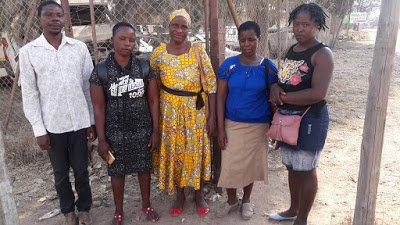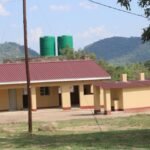…provincial veterinary
officer dismisses crisis as ‘non-issue’
officer dismisses crisis as ‘non-issue’
Moses
Ziyambi
Ziyambi
GUTU
– Masvingo Provincial Veterinary Officer Enerst
Dzimwasha has been criticised for his alleged ineffectual handling of a
tick-borne disease which is wiping entire herds of cattle in several areas
under Gutu district.
– Masvingo Provincial Veterinary Officer Enerst
Dzimwasha has been criticised for his alleged ineffectual handling of a
tick-borne disease which is wiping entire herds of cattle in several areas
under Gutu district.
The disease, commonly
known as January Disease, has wiped entire heads in such places as Guni,
Makore, Chiwara in Gutu South and Makumbe in Gutu North.
known as January Disease, has wiped entire heads in such places as Guni,
Makore, Chiwara in Gutu South and Makumbe in Gutu North.
The disease is also
present in such parts of Gutu West as Serima as well as Munyikwa in Gutu East though
it is not much prevalent.
present in such parts of Gutu West as Serima as well as Munyikwa in Gutu East though
it is not much prevalent.
Villagers from some of
these areas who spoke to TellZim News blamed poor educative communication from
the Masvingo Provincial Veterinary Office which is headed by Dzimwasha.
these areas who spoke to TellZim News blamed poor educative communication from
the Masvingo Provincial Veterinary Office which is headed by Dzimwasha.
They also blamed the
department for prioritising the collection of livestock tax without providing
the requisite dipping services at regular intervals.
department for prioritising the collection of livestock tax without providing
the requisite dipping services at regular intervals.
They said communication
between communities and the veterinary offices that are scattered at selected
centres in the district was largely non-existent.
between communities and the veterinary offices that are scattered at selected
centres in the district was largely non-existent.
“There are no more
cattle in this village and we have become poorer than ever before. Cattle mean
a lot for the village economy and if you take away that, you create paupers,”
said one villager under Chief Makore who lost his entire herd of seven cattle
beginning from April this year.
cattle in this village and we have become poorer than ever before. Cattle mean
a lot for the village economy and if you take away that, you create paupers,”
said one villager under Chief Makore who lost his entire herd of seven cattle
beginning from April this year.
Villagers under Chief
Serima said the Veterinary Services Department rarely supplied dipping
chemicals, a problem which they blamed for the outbreak of the tick-borne
disease.
Serima said the Veterinary Services Department rarely supplied dipping
chemicals, a problem which they blamed for the outbreak of the tick-borne
disease.
“Whenever you see a
veterinary officer, he is coming to talk about the money we must pay for every cow
in the pen. They claim that if we pay the money, they are then able to buy
chemicals so that our cattle can go to the dip tank regularly, but that is not
happening. We are just paying but we are not getting the service,” said one
villager who lost three cattle in three months.
veterinary officer, he is coming to talk about the money we must pay for every cow
in the pen. They claim that if we pay the money, they are then able to buy
chemicals so that our cattle can go to the dip tank regularly, but that is not
happening. We are just paying but we are not getting the service,” said one
villager who lost three cattle in three months.
Other villagers said
they rarely receive information on how to keep their cattle safe in light of
the many diseases affecting livestock.
they rarely receive information on how to keep their cattle safe in light of
the many diseases affecting livestock.
When Dzimwasha was
contacted for comment, he dismissed concerns about the disease saying it was
now a ‘tired’ issue.
contacted for comment, he dismissed concerns about the disease saying it was
now a ‘tired’ issue.
“That is a very old
issue which is no longer urgent. I don’t have time for that because I am busy
attending a workshop at a hotel in Bulawayo and cannot keep on talking about
those issues,” said Dzimwasha.
issue which is no longer urgent. I don’t have time for that because I am busy
attending a workshop at a hotel in Bulawayo and cannot keep on talking about
those issues,” said Dzimwasha.
A veterinary
practitioner in Masvingo urged people to buy their own dipping chemicals and
spray their cattle.
practitioner in Masvingo urged people to buy their own dipping chemicals and
spray their cattle.
“It’s likely to get
worse as we approach the rainy season where new grazing will sprout. The ticks
thrive in good pastures. People can buy such chemicals as Butachem which can
treat affected cattle. It is also recommended that people immunise their cattle
using such chemicals as Parasite and Tick Guard,” said the vet practitioner.
worse as we approach the rainy season where new grazing will sprout. The ticks
thrive in good pastures. People can buy such chemicals as Butachem which can
treat affected cattle. It is also recommended that people immunise their cattle
using such chemicals as Parasite and Tick Guard,” said the vet practitioner.
The Provincial
Veterinary Office is located within the Division of Veterinary Field Services
under the Department of Livestock and Veterinary Services in the Ministry of
Agriculture, Mechanisation and Irrigation Development.
Veterinary Office is located within the Division of Veterinary Field Services
under the Department of Livestock and Veterinary Services in the Ministry of
Agriculture, Mechanisation and Irrigation Development.
Some
of the department’s listed duties include providing extension and advisory
services on good animal health care, hygiene and husbandry as well as carrying out surveillance, prevention, control and eradication of
specified animal diseases and pests.
of the department’s listed duties include providing extension and advisory
services on good animal health care, hygiene and husbandry as well as carrying out surveillance, prevention, control and eradication of
specified animal diseases and pests.







